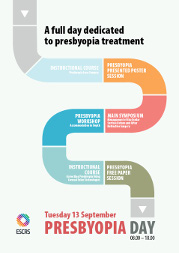Posters
Study of the association between polymorphisms in DNA repair gene XPC and inductor of apoptosis gene p53 and presenile cataract development
Poster Details
First Author: G. Lopez Valverde SPAIN
Co Author(s): P. Pizarro Thompson E. Garcia Martin J. Larrosa Poves V. Polo Llorens L. Pablo Julvez
Abstract Details
Purpose:
To determine whether the presence of certain polymorphisms in the DNA repair gene XPC and in the inductor of apoptosis gene p53 is associated with the onset of cataracts at an early age.
Setting:
Hospital Universitario Miguel Servet, Zaragoza, Spain
Methods:
A retrospective study over three groups of patients: group with presenile cataracts, another with senile cataracts and the group without cataracts.
To form the group with presenile cataracts we included 72 patients younger than 55, who underwent cataract surgery; 101 patients older than 55 in the group of senile cataracts and 42 subjects older than 55 in the group without cataract.
We studied the genotype distribution of the polymorphisms rs2228000 XPC and rs1042522 p53 among the different groups. We also studied the relationship with some risk factors (RF) such as smoking, alcohol intake and presence of hypertension or diabetes.
Results:
The comparison of rs2228000 XPC genotype distribution among the different groups of study did not show any statistical significant association (p>0,05), not even when performing the analysis adjusting by the studied RF.
The comparison of rs1042522 p53 between the different groups did not show any statistical significant association (p>0,05) except for the comparison between the presenile cataract group and the senile cataract group which showed an increased risk for developing cataract at an early age for the genotype Pro/Pro in the recessive inheritance model (p=0,031; OR=1,04-15,97). This association decreased when performing the analysis adjusting by the studied RF (p=0,056).
Conclusions:
Allelic variants of the gene XPC are not associated with a major risk of developing cataracts at an early age in our groups of study. The presence of the genotype Pro/Pro in the gene p53 could be related with an increase of the risk for developing presenile cataracts.
Financial Disclosure:
NONE





